In late summer 2016 Lauren Stowell, creator of American Duchess, announced that plans were in the works for her and her new assistant, Abby Cox, to publish a book on sewing 18th century garments.
Whoo-hoo!! The shouts were audible from her friends and followers.
Since I focus primarily on 19th century sewing but have wanted to do more in this earlier time frame I was excited like everyone else. After they started working on the projects for the book and showing snippets on Instagram I placed the pre-order for my own copy. (Get yours here.)
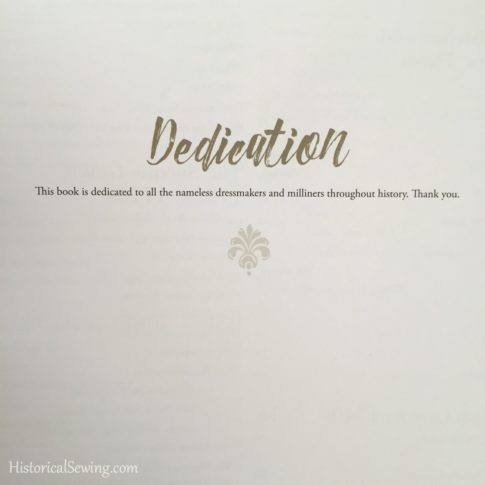
In August 2017 Abby and I began chatting about the new book and how we could collaborate using their new publication with what I do teaching actual sewing steps through online workshops (what I call classes).
I am super excited about this which you can read more about and watch their video on in this post. Because of this communication they added me to the small list of those who received an advanced copy of the book – THANK YOU!
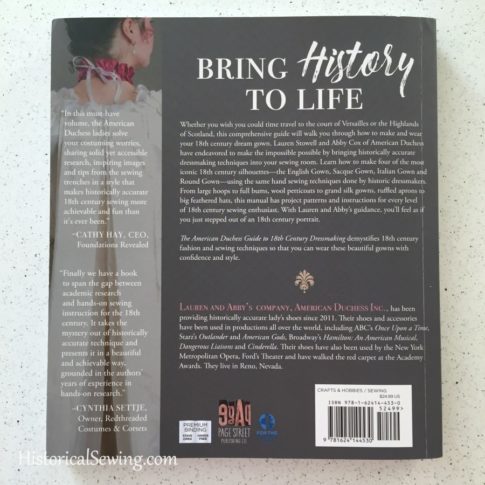
I waited in anticipation, watching my post mail every day until it appeared…
I’ve had the book just about 10 days now and have read every page. It’s delightful. It’s instructive. It’s inspiring me to sew.
And it’s simply beautiful and delicious!!
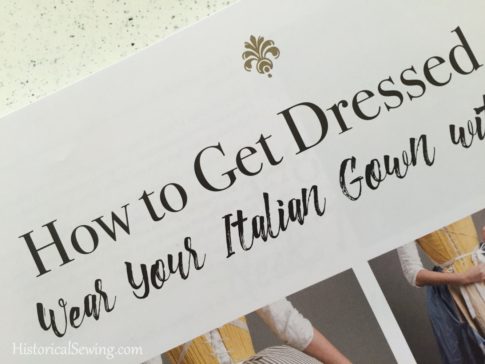
I mean, I’ve enjoyed skirting (ha!) around 18th century costuming and research for many years, but this book has made me want to make Every.Project! Yes!
The book is written in fun, modern language that makes it easy to read – almost like a blog post. But not only that, the layout, the photos, the goodie text of fabric selections, and detailed sewing instructions is inspirational.
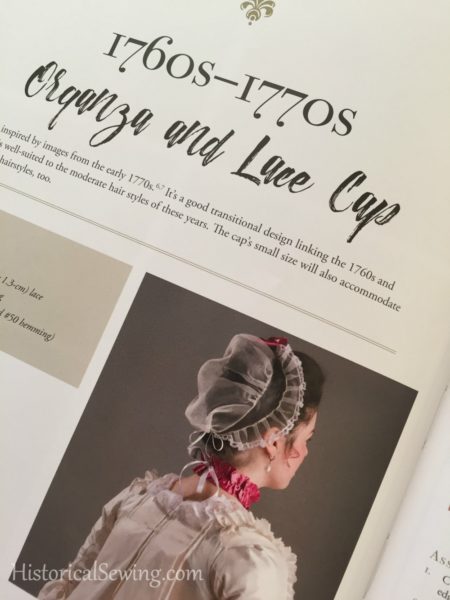
I would finish reading a section on a gown or one of *many* accessory items – millinery items – given and got excited at the prospect of making my own before too long.
Truly, who doesn’t want to parade around in floating flounces or wispy aprons or fluffy caps or custom-fit dresses??
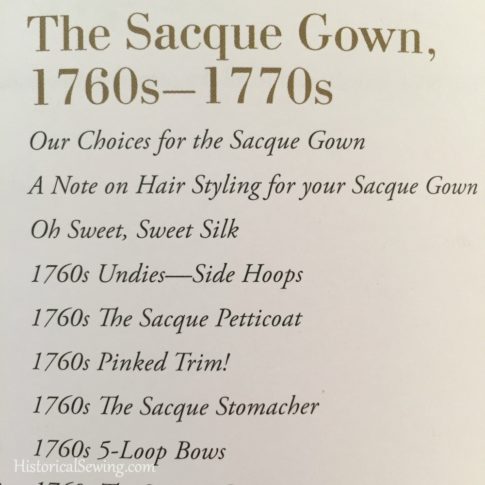
The book has five main chapters – a section on hand stitches used (invaluable!!), then four ensembles complete with undergarments and accessories.
- The English Gown, 1740s
- The Sacque Gown, 1760s-1770s
- The Italian Gown, 1770s-1790s
- The Round Gown, 1790s
The listing of citations, reference books and original garments used for inspiration adds depth to the publication.
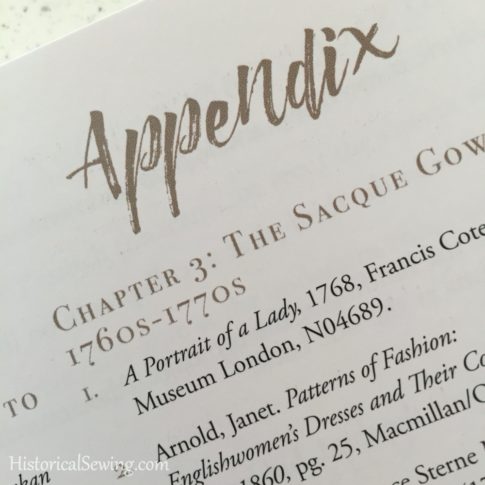
Readers will find excellent notes on the four natural fiber fabrics and how they’re used. And I’m delighted to see Lauren and Abby use them all separately as the main fabric in each of the four gown projects.
The sections on getting dressed in each ensemble is super appreciated and handy for those of us getting deeper into this century of costuming.
It’s inspiring that throughout the book they mention that certain stitches or areas don’t have to be perfect when making up and that ours, the reader and dressmaker, don’t have to be perfect either. Fabulous! I love how this makes it seem we are creating clothing and not simply a generic costume.
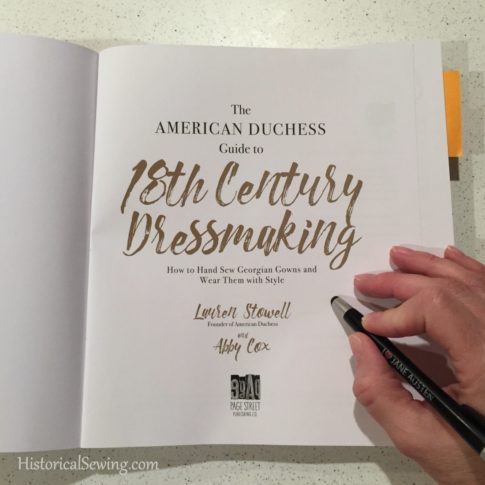
What surprised me at first about the book, in general, is that it’s much shorter than I would have expected. The height that’s there in other technical sewing books is gone. Not that it makes too much of a difference. Just saying it’s a more compact size and square shaped.
The book is quite heavy with 240 pages. What I love most about the publication is the nice spine that stays open when laid out. Brilliant for when you need both hands to sew but also need to refer to the photos. 😉
Speaking of photos – beautiful! Nice and clear production.
However, I have to knock the editors a bit as some of the photo selections printed show up-close details, yet they are hard to understand what’s going on at the moment in the construction. More clarification on a few sewing steps would have been helpful with additional photos or even different ones chosen. It seems the layouts were not done by someone with intimate sewing knowledge which could throw off some newbies to this time period.
No worries though. As a technical sewing writer myself, I believe that when someone will be following the instructions as they sew and come to parts with (possibly) confusing photos they will make sense at that time. Reading the text without a project in front of you could be a little unclear.
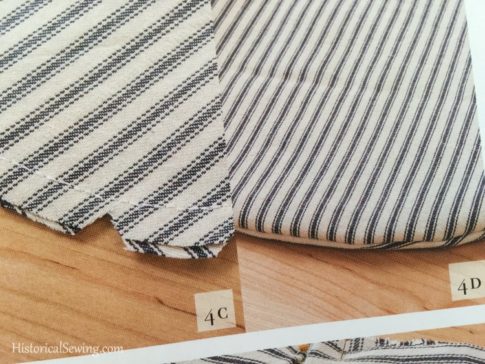
Also, a bit more rub on the photo layouts – many times there are “1A” and “1B” labeled photos in one photo “box.” I wish the editors would have put a tiny bit of spacing between the two connected photos for clarity to the reader. Oh well.
Overall, the book is very well done with the photos and sewing directions. At other times it seems overwhelming and muddled. I understand there are limits to photos and flat text in a book, and I’m more than confident that Lauren and Abby worked to publish a well-presented set of dressmaking instructions.
If only the text wasn’t so tiny…..
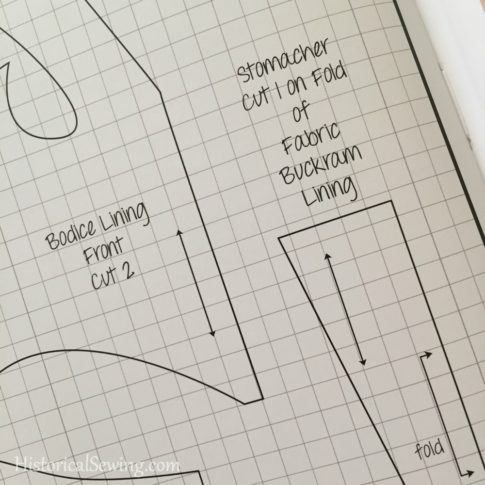
If you’re wanting to use the gridded patterns included in the book – a great addition to use as a guide – I recommend you pay close attention to the grainlines given on the templates as it’s not always described in the sewing instructions.
I found a few places here and there that could use some clarification, and the grainlines not being discussed were one such area. As for others, be sure to join my online classes when they open for enrollment for greater in-depth help at putting these garments and accessories together. Lauren and Abby will be popping into the classes for additional dressmaking info as we sew.
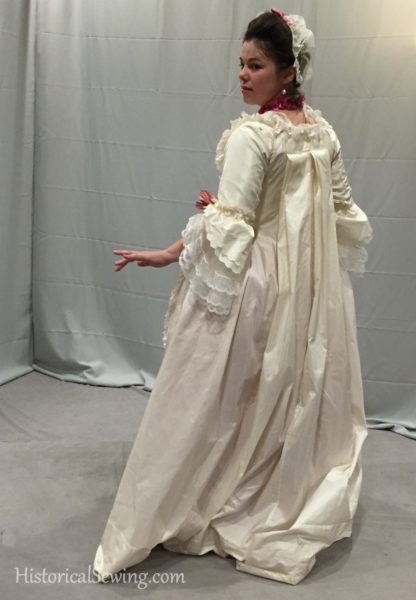
Lastly, I have to say congratulations and well done to Lauren and Abby!
Thank you for making our bookcases brighter and our dreams of lovely gowns within reach!!
You’ll now find me busy making lots of lovely pinked and gathered and hand-sewn things. 🙂
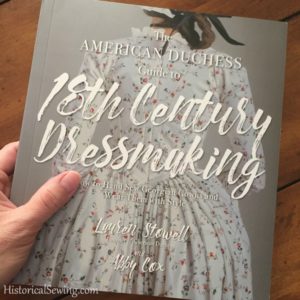
The American Duchess Guide to 18th Century Dressmaking is sold on Amazon and other major booksellers around the world. Worth.Every.Penny! Most of us who know the depth of this research and instruction would happily pay more than the listed retail price. Go get your copy!

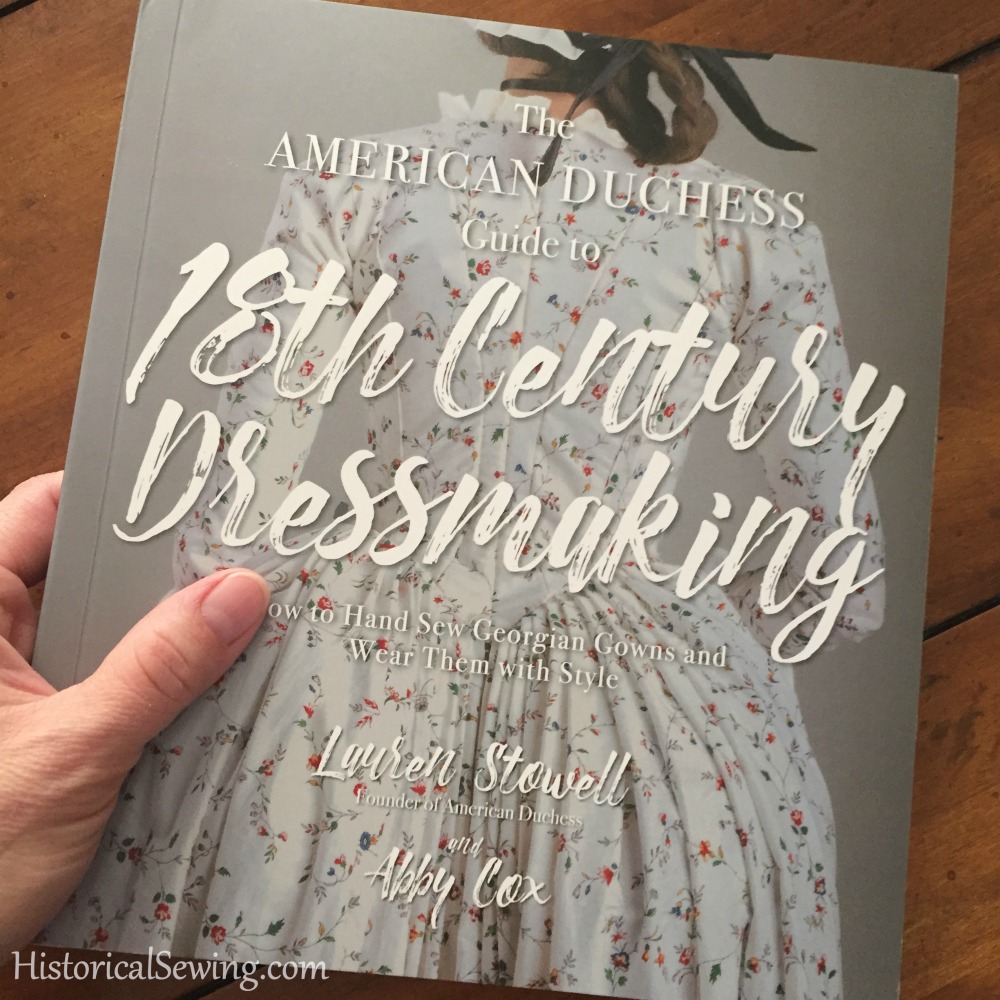
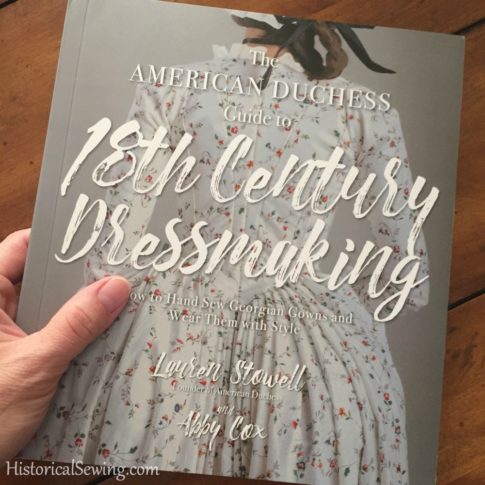
I had a question.. in this book I love the the first undergarment shift that Nicole wears, which has a 3/4 blouson sleeve with a cuff. This pattern isn’t covered in the book or the simplicity patterns they offer. Do you happen to know where a sleeve pattern for this could be found? Do I take one of the normal shift patterns and try to adapt the sleeve? Any guidance would be helpful! Thanks!!
I left a review on Amazon in which I said I longed for either better photos of sewing techniques or line drawings. So glad to see a real expert say basically the same thing. I wasn’t off base. I use the book often for accessories. As I am still pattern bound.
The accessories are wonderful! I, too, am still reliant on patterns. 🙂
Did you know Nelson History 7? There are Rococo dresses from 1713-1770. And look at the British fashions which you wanted to sew just like your book! You can look at both Rococo and Regency dresses and make it into life!
I preordered some time ago, can’t wait for it to arrive! I won’t be sewing straight away as I’ll be recovering from surgery, but I’m looking forward to planning my next project anyway.
You will love it! So much info you won’t be bored after your surgery. 🙂
Hi Jennifer!
This is a bit unrelated but I was wondering if you had any advice for proportions in your historical sewing. I am struggling a lot since my bustles, huge box pleats and natural form dresses also look a bit “off”. I really want to take my historical sewing to the next level. Do you have any advice and personal experiences to help me make my proportions look right and better? Thanks for your wonderful blog, it has helped me have the confidence to make the leap into historical costuming!
Thanks for reading, Janet, and glad the blog has proved helpful. I’m so happy to hear this!
As for proportions, there is an “eye” that comes over time to know “sizing” on your personal figure. I’ll point you in the direction of my blog post on copying fashion plates as I give proportional info there. It would be the same when looking at any painting or portrait you want to make. Use a photo of yourself in costume and match it to what you want it to look like and scale down. Then transfer those new numbers to your pattern drafting. Again, it’s all in the “eye” to building it, but one can also learn how much to scale down or up or out for the job at hand. I think most costumers struggle with proportion, so know you are in a class of those in “pursuit of perfection.” 🙂
Jennifer, I ordered the book immediately from Amazon, even before finishing your post! I’m so excited! I’ve taken one of your classes online, as well as many at Costume College. I loved Lauren’s class at Costume College also. This is a match made in Heaven! I’ve made a 18th century dress with Mela Hoyt-Hayden, which was a fabulous challenge and the dress came out beautifully but I’m looking forward to making another with you and American Duchess. So much fun to have a glorious project to work on at the start of the new year. Thanks for your in depth review of the book. Can’t wait to get my copy and see your class schedule.
Thanks for your interest and enthusiasm, Patti! 🙂
I have this pre-ordered and can’t wait to take your classes! I am so excited to work on 18th century garments- especially a riding habit!!!
Awesome!
I pre-ordered the book and looking forward to your class. Also purchased on amazon Costume Close-up 1750-1790 as a head start recourse to the period of history and construction of women’s clothing.
Costume Close-Up is a fantastic resource book!
I pre-ordered as soon as I saw the mention of the book project. Anxiously awaiting printing and release. Don’t really need an excuse to want a new dress, but having donated an armload of older gowns to a local high school drama department, that means that space is available for something new.